|
|
|
Sort Order |
|
|
|
Items / Page
|
|
|
|
|
|
|
| Srl | Item |
| 1 |
ID:
154794


|
|
|
|
|
| Summary/Abstract |
China’s rise as a (re)emerging donor has attracted attention over the last decade, with a focus on Chinese development assistance as a challenge to the Organisation for Economic Cooperation and Development (OECD) aid norms. Knowledge of China’s domestic aid structure is needed to understand Chinese aid abroad. This paper addresses gaps in the literature and challenges the accepted nostrum that China’s Ministry of Commerce (MOFCOM) dominates China’s aid programme. Building on the authors’ experience as Chinese aid practitioners and scholars over more than a decade and drawing on over 300 interviews, the paper explores China’s aid decision-making processes by examining the main agencies, identities and informal interactions. We argue that the Chinese aid system is characterised by fierce and ongoing competition for influence among actors, especially MOFCOM, the Ministry of Foreign Affairs (MFA) and the Ministry of Finance (MoF), as well as the companies responsible for implementing Chinese aid projects.
|
|
|
|
|
|
|
|
|
|
|
|
|
|
|
|
| 2 |
ID:
154786


|
|
|
|
|
| Summary/Abstract |
The importance of science in development has been increasingly recognised in development discourses and policy since 2000. Engineering is less visible though engineering and engineers are important for the building and maintenance of transport, water, energy, industrial, informatics, urban and health systems. This article aims to investigate why engineering has not received more emphasis, including why development engineering has not been institutionalised like tropical medicine. It explores the nature of engineering in development, highlights recent efforts to headline engineering for development and, using analyses of what engineers know and do inside international development, suggests that its profile and effectiveness is emerging.
|
|
|
|
|
|
|
|
|
|
|
|
|
|
|
|
| 3 |
ID:
154787
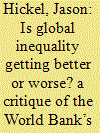

|
|
|
|
|
| Summary/Abstract |
The dominant narrative of global income inequality is one of convergence. Recent high-profile publications by Branko Milanovic and the World Bank claim that the global Gini coefficient has declined since 1988, and that inter-country inequality has declined since 1960. But the convergence narrative relies on a misleading presentation of the data. It obscures the fact that convergence is driven mostly by China; it fails to acknowledge rising absolute inequality; and it ignores divergence between geopolitical regions. This paper suggests alternative measures that bring geopolitics back in by looking at the gap between the core and periphery of the world system. From this perspective, global inequality has tripled since 1960.
|
|
|
|
|
|
|
|
|
|
|
|
|
|
|
|
| 4 |
ID:
154792


|
|
|
|
|
| Summary/Abstract |
What light can foreign policy analysis (FPA) shed on how and when the balance of power between domestic coalitions in foreign nuclear policymaking changes and how these different balances directly affect policy outcomes? Drawing on interviews with scientists, technologists and career diplomats, this comprehensive examination of Argentine nuclear exports policy as public policy aims to depict when and how policies varied between 1976 and 2004, due to shifts in the balance amongst advocacy coalitions, albeit of incentives and constraints placed by international and institutional nuclear environments. The article provides a better account of how Argentine nuclear foreign policy changed under the influence of four competitive and contrasting advocacy coalitions: the pro-import substitution and protectionist coalition, the pro-technological autonomy and South-South trade coalition, the pro-business and commercial openness coalition and the antinuclear and pro-environment coalition.
|
|
|
|
|
|
|
|
|
|
|
|
|
|
|
|
| 5 |
ID:
154791
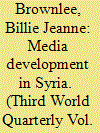

|
|
|
|
|
| Summary/Abstract |
This article intends to provide responses to some of the many unanswered questions about the making and the transformation of the uprising in Syria by exploring a new avenue of research: media development aid. Most academic interest has been oriented towards the role that the new media played at the time of the uprising; insufficient interest, by contrast, has been directed to the development of the sector in the years predating it. What emerges from this article is that the Syrian media landscape was strongly supported by international development aid during the years prior to the outbreak of the uprising of 2011. By looking at the complex structure of media aid architecture and investigating the practices and programmes implemented by some representative organisations, this article reflects on the field of media development as a new modus operandi of the West (the EU and US especially), to promote democracy through alternative and non-collateral, bottom-up support.
|
|
|
|
|
|
|
|
|
|
|
|
|
|
|
|
| 6 |
ID:
154796
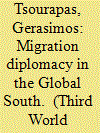

|
|
|
|
|
| Summary/Abstract |
Despite a recent resurgence in research on the politics of migration, foreign policy analysts have yet to approach cross-border population mobility as a distinct field of inquiry. Particularly within the Global South, scant work has theorised the interplay between migration and interstate bargaining. This article proposes the framework of migration diplomacy to examine how mobility features in states’ issue-linkage strategies, in both cooperative and coercive contexts. Drawing on Arabic, French and English primary sources, it empirically demonstrates the salience of its framework through an analysis of Libya’s migration diplomacy towards its Arab, African and European neighbours under Muammar Gaddafi.
|
|
|
|
|
|
|
|
|
|
|
|
|
|
|
|
| 7 |
ID:
154788
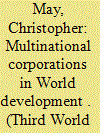

|
|
|
|
|
| Summary/Abstract |
In light of the 2014 Ecuador-sponsored resolution at the UN Human Rights Council to examine the link between Transnational Corporations and Human Rights, in this paper I review the first major discussion at the United Nations of the role of multinational corporations. The report on Multinational Corporations in World Development (1973) for the UN Department of Economic and Social affair launched the (then) new UN Centre on Transnational Corporations. I examine the report in some detail, compare and contrast this with the Ecuadorian resolution from 2014, and reflect on the continuities and changes in attempts to regulate the conduct of global corporations over the 40 years between these two moments.
|
|
|
|
|
|
|
|
|
|
|
|
|
|
|
|
| 8 |
ID:
154789
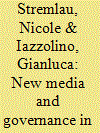

|
|
|
|
|
| Summary/Abstract |
The role of new media in shaping the interactions of formal and informal leaders with their audiences is frequently misunderstood and often narrowly focussed on electoral processes and political competition. By weaving together strands of scholarship on political communication and political settlement while engaging with concepts of hybrid governance and leadership more prevalent in the African studies literature, this article takes a different, wider focus. We attempt to knit a framework that challenges normative assumptions on institutional communicative practices and considers the role of power, leadership and communications in both exacerbating and mitigating violent conflict in emerging and consolidating democracies. By bringing together disparate strands of scholarship that are rarely in dialogue, we question a characterisation that contrasts vertical mainstream media with more horizontal and inclusive social media, arguing that a more nuanced view of the political significance of these spaces is required, one that highlights their interplay and blurs the boundaries between online and offline. In doing so, the article places power at the centre of analysis to examine how entrenched relations of patronage can be left unscathed, transformed or even reinforced by networked forms of communication.
|
|
|
|
|
|
|
|
|
|
|
|
|
|
|
|
| 9 |
ID:
154790
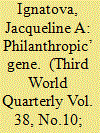

|
|
|
|
|
| Summary/Abstract |
Climate change and population growth have prompted calls for African countries to embrace a ‘new Green Revolution’ in order to promote food security. What is ‘new’ about this new Green Revolution? What configurations of capital, the state, agribusiness, and the law define this period of agricultural transition? In this new Green Revolution, I argue, there is a proliferation of new forms of capital – biocapital and philanthrocapital – that integrate biotechnology with philanthropy to create market value. These shifts are engendered by philanthropic giving, in the form of donated genetic material for the development of ‘pro-poor’ biotechnology which normalises seed as commodity, and legislative reform that renders seed patentable material.
|
|
|
|
|
|
|
|
|
|
|
|
|
|
|
|
| 10 |
ID:
154785


|
|
|
|
|
| Summary/Abstract |
This article explores the relationships between (so-called) ‘non-traditional’ development cooperation (NTDC) and political leadership. Using the case studies of Brazil and South Korea, we propose that certain emblematic elements of NTDC discourse and practice can act to influence the relationship with political leaders in particular ways. These are (a) elevated language of affect, (b) interleaving of personal biographies with the developmental trajectories of states, (c) the use of NTDC to legitimise domestic policies and promote domestic political leadership, (d) the prominence of presidential diplomacy and (e) the challenges confronting rapidly expanding domestic development cooperation institutions and systems.
|
|
|
|
|
|
|
|
|
|
|
|
|
|
|
|
| 11 |
ID:
154795
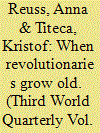

|
|
|
|
|
| Summary/Abstract |
The liberation struggle plays a crucial role in providing legitimacy for post-liberation regimes. This was the case for the Museveni regime, for whom the liberation argument provided strong moral authority, and a legitimising foundation for its patronage and coercion strategies. But what happens when the liberation argument ‘grows old’, i.e. when the liberation generation elite starts to die or defect, and the young population is no longer impressed by the liberation argument? This article argues that in response to this changing situation, the Museveni regime almost exclusively relies on patronage and coercion, yet is increasingly devoid of the legitimising liberation foundation.
|
|
|
|
|
|
|
|
|
|
|
|
|
|
|
|
| 12 |
ID:
154793
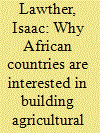

|
|
|
|
|
| Summary/Abstract |
Ten years ago, China and several African countries began to develop agricultural training centres, and opened the door for a cascade of optimism and pessimism on why China is interested in developing agricultural partnerships in Africa. Seldom has the appeal of such partnerships for African countries been explored, hence limiting our capacity to fully understand the dynamics of Sino–African agricultural relations. This article addresses the issue by examining why some African countries are interested in partnering with China in agricultural development. This article is based on 44 interviews that were conducted in 2015 at the Sino–African agricultural training centres in Rwanda and Uganda. I argue that Rwanda and Uganda seek to partner with China, as China can offer intermediary agricultural technologies that enable these respective countries to implement aspects of their domestic agricultural development plans. The article also provides reason to challenge the existing optimistic and pessimistic conventions about Sino–African agricultural affairs.
|
|
|
|
|
|
|
|
|
|
|
|
|
|
|
|
|
|
|
|
|